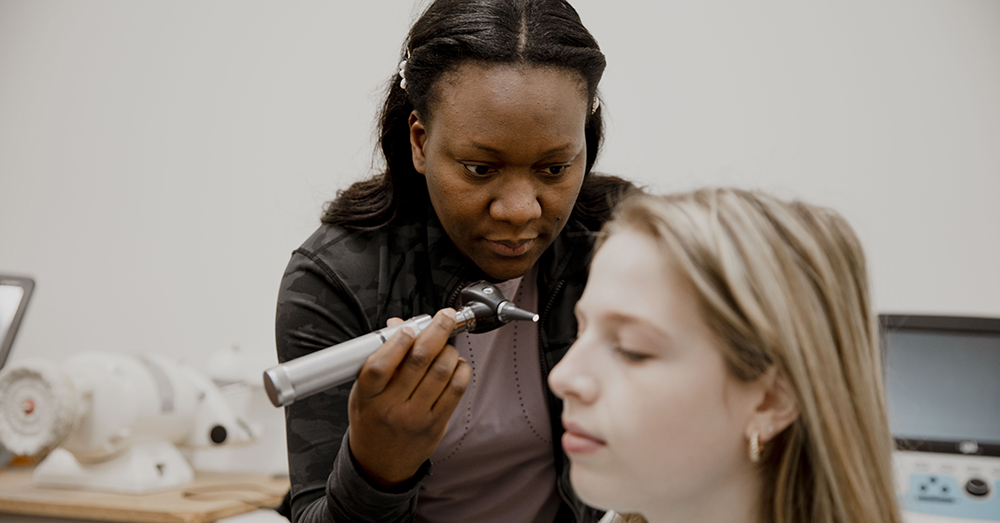Noise-Induced Hearing Loss in Rural Adolescents
The quiet rural life isn’t necessarily so quiet, and hearing protection is crucial.

Noise-induced hearing loss affects almost 24 percent of adults
Did your mom or dad ever tell you to turn your music down, or you would lose your hearing? Well, it turns out they might have been right.
According to the CDC, noise-induced hearing loss affects almost 24 percent of adults. It also affects children, with one study showing that 12 to 15 percent of school-aged children experience some form of hearing loss attributable to noise exposure.
We spoke with Leigh Ann Reel, Au.D., Ph.D., CCC-A, Director of the Center for Speech, Language, and Hearing Research in the Doctor of Audiology Program of the TTUHSC School of Health Professions about the causes and prevention strategies for noise-induced hearing loss, particularly for adolescents in rural areas.
What is Noise-Induced Hearing Loss?
“If you’re exposed to noise at certain levels, it can damage your hearing,” Reel begins. “The damage mainly affects the structures of your inner ear, which are very delicate.”

Leigh Ann Reel, Au.D., Ph.D., CCC-A
Loud Noises in Rural Areas
We often think of rural areas as quiet and peaceful, which they are. However, for people who live and work in rural settings, there are more loud noises than one might realize.
In fact, the prevalence of noise-induced hearing loss in rural children is almost double that of the general population of children.
“I grew up in rural West Texas,” Reel says. “I never lived in a town until I went to college.” This upbringing is a big part of what motivated Reel to do the work that she does. She remembers that practically no one wore hearing protection when she was growing up.
“It turns out that there’s not a lot of research on noise exposure for rural kids, so that’s where I started,” she explains.
There are many sources for loud noise that could damage one’s hearing in rural settings.
Some examples include:
- Guns
- Farm equipment
- Power tools
- ATVs
- Fireworks
“Guns are at the top of the list because they're so loud,” Reel says. “Even a single gunshot can be loud enough to cause damage to hearing if you’re not wearing protection.” This is true whether you’re the shooter or a bystander.
Reel also points out that some children begin helping on farms at an early age, exposing them to noise from loud machinery and power tools.
“In our study, most rural adolescents reported they did not consistently wear hearing protection,” she says. In fact, only about half of the children in the study reported ever wearing hearing protection around guns.
Reel is on a mission to educate children and adults on the importance of using hearing protection.
Signs of Hearing Loss
How do you know if you’re suffering from noise-induced hearing loss?
“If you’re around a loud noise, such as a concert or gunfire, your ears will typically ring for a while after the exposure,” Reel explains. “Your ears may also feel full, and you might not hear as well. Typically, those symptoms improve in a matter of hours to a couple of days after exposure.”
This causes people to think no damage occurred because the symptoms seem to go away, but Reel says that each time this exposure happens, the listener is likely left with a small degree of permanent hearing damage.
“These small amounts of permanent damage to the ear structures eventually add up to where you start noticing problems in daily life that aren’t going away,” she cautions.
Symptoms of hearing loss include:
- Tinnitus – a ringing in the ears
- Hearing difficulties – having trouble hearing higher-pitched sounds, with speech understanding being compromised
- Hyperacusis – discomfort around a loud sound that isn’t loud enough to be uncomfortable to others, such as a public toilet, hair dryer, or blender
Reel stresses the fact that noise-induced hearing loss can begin at any age. It doesn’t just happen to older adults, and unfortunately, this type of hearing loss isn’t something that can be recovered. Once the damage is done, it is permanent.
“Once the delicate parts of your inner ear are damaged, they don’t regenerate,” she says.” This is why prevention is key.
Hearing-Loss Prevention
Reel is quick to explain that audiologists do not expect people to avoid the activities they enjoy or the work they need to do. Loud noise is a part of life. The key is to wear hearing protection, no matter how young or how old you are. If kids become accustomed to wearing hearing protection from an early age, it is more likely to become part of their routine.
Parents can help by setting the example of always wearing hearing protection around loud noise, such as when using power tools or shooting guns.
The good news is that noise-induced hearing loss is preventable. There are types of hearing protection available for children as young as infants, and it could make all the difference.
Related Stories
The John Wayne Cancer Foundation Surgical Oncology Fellowship Program at Texas Tech University Health Sciences Center Announced
TTUHSC is collaborating with the John Wayne Cancer Foundation and has established the Big Cure Endowment, which supports the university’s efforts to reduce cancer incidence and increase survivability of people in rural and underserved areas.
Making Mental Health a Priority in the New Year
Sarah Mallard Wakefield, M.D., a psychiatrist with Texas Tech Physicians, talks about strategies to combat widespread and growing anxiety.
TTUHSC Dean to be Inducted into the National Academies of Practice as Distinguished Fellow
Gerard E. Carrino, Ph.D., MPH, dean of the TTUHSC Julia Jones Matthews School of Population and Public Health, will be inducted into the National Academies of Practice (NAP) as a Distinguished Fellow of the Public Health Academy.
Recent Stories
The John Wayne Cancer Foundation Surgical Oncology Fellowship Program at Texas Tech University Health Sciences Center Announced
TTUHSC is collaborating with the John Wayne Cancer Foundation and has established the Big Cure Endowment, which supports the university’s efforts to reduce cancer incidence and increase survivability of people in rural and underserved areas.
TTUHSC Receives $1 Million Gift from Amarillo National Bank to Expand and Enhance Pediatric Care in the Panhandle
TTUHSC School of Medicine leaders accepted a $1 million philanthropic gift from Amarillo National Bank on Tuesday (Feb. 10), marking a transformational investment in pediatric care for the Texas Panhandle.
Texas Tech University Health Sciences Center Permian Basin Announces Pediatric Residency Program Gift
TTUHSC Permian Basin, along with the Permian Strategic Partnership and the Scharbauer Foundation, Feb. 5 announced a gift that will fund a new pediatric residency.
